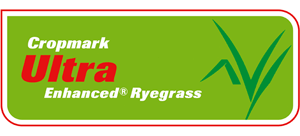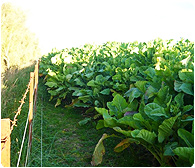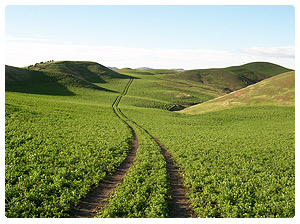 Latest National Forage Variety Trial results
Latest National Forage Variety Trial results
The New Zealand National Forage Variety Trial (NFVT) system was set up by the New Zealand Plant Breeding and Research Association Inc (NZPBRA), to promote plant breeding and research in New Zealand.
The latest National Forage Variety Trial (NFVT) 1991-2011 Summary, has just been published by the New Zealand Plant Breeders Association - the industry body responsible for running the NFVT trialling system.
The standout product that came of these trials was
Ultra Enhanced perennial ryegrass.
Ultra ryegrass was not only the winner for the highest total yield for the whole year, but it beat out every other perennial ryegrass variety throughout every season in the latest New Zealand NFVT® summaries.
 Ultra Enhanced ® perennial ryegrass
Ultra Enhanced ® perennial ryegrass
Ultra Enhanced ® perennial ryegrass is the latest release from the Cropmark breeding programme.
Ultra ryegrass is a fine leaved, very densely tillered, late heading diploid Enhanced ® ryegrass which combines the best traits of its parents - the high levels of pasture production available from perennial ryegrass, coupled with the feed quality attributes of meadow fescue.
Download Link: Download the
Ultra Perennial Ryegrass PDF brochure.
Contact Link: Please
contact Specialty Seeds today to try Ultra perennial ryegrass on your property.
Contact Link: Please
contact Specialty Seeds today to try Ultra perennial ryegrass on your property.
Back to top
 How to measure your Brassica Green Feed Crop
How to measure your Brassica Green Feed Crop
Measuring your Winter Brassica Green Feed Crop is a very important part of Winter Feed Budgeting.

This should be carried out more than once during the Winter as in a lot of cases your crop will significantly increase its yield during the winter.
Farmers normally expect low growth rates of all plants based on their pasture growth observations but this is not the case with brassicas.
Specialty Seeds strongly advises farmers planning to feed out winter brassica crops that they contact their local vet to discuss with them the potential stock health issues that are commonly associated with feeding out a winter crop.
Please click on the following download link to get instructions on a simple but effective way to measure your crop.
Download Link: Download the
How to measure a Brassica Crop information brochure.
Website Link: Click here to go to the
Specialty Seeds Downloads website page.
Contact Link: Please
contact Specialty Seeds if you have any pasture queries.
Back to top
 Lucerne Winter Maintance Program
Lucerne Winter Maintance Program

It's been a great year for most crops this year with Lucerne being no exception. I have seen Lucerne being harvested during May this year.
The winter months of June and July are the best ones to set up your Lucerne crop for the coming Spring.
The two main jobs to be done at this time of the year are: Weed Control and Fertilising.
Weed Control:
For established Lucerne paddocks the following spraying recommendation will control a wide range of annual weeds very effectively.
Some of these weeds include seedling Sheppard's purse, annual grasses and storksbill.
For more information on these individual products and to make sure you are using them at the correct time and in the right conditions please either
contact Specialty Seeds or click on the the products above to download their labels for more detail.
Fertiliser:
If we look at the fertilisers most removed by Lucerne the two that stick out are both Potassium (@ 22 kgs per tonne dry matter) and Calcium (@ 13.8 kgs per tonne of dry matter) therefore these need to be replaced.
We would recommend that the best time to replace the potassium is by giving it the first application after the first cut (immediately after harvest to avoid potentially burning the re growth) in early spring followed by further application after every second cut.
Lime at a rate of 2.5 tonnes per hectare should be applied every 3-5 years (during the winter) to maintain Lucernes preferred pH levels, typically 6 pH.
Website Link: Click here to go to the
Specialty Seeds Downloads website page.
Contact Link: Please
click here to contact Specialty Seeds today.
Back to top

Back to top

As always, we hope this issue has been of some value to you. If you have a comment on this newsletter or anything on our website, please give us a call on our
Freephone: 0800 727 8873, send us an email at:
mail@specseed.co.nz.
Kind Regards

Stephen Finch & David Percival
Specialty Seeds - New Zealand

